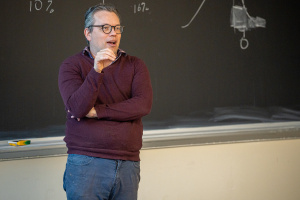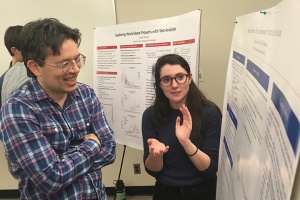
F. Daniel Hidalgo
Associate Professor of Political Science
Latin America; political institutions; representation; accountability; clientelism; causal inference; elections.
Biography
F. Daniel Hidalgo is Associate Professor of Political Science at the Massachusetts Institute of Technology. He received his doctorate in Political Science at the University of California at Berkeley and received a BA at Princeton University. Hidalgo is a past recipient of grants from the National Science Foundation, the Fulbright program, and the Experiments in Governance and Politics Network. His research focuses on the political economy of elections, campaigns, and representation in developing democracies, especially in Latin America, as well as quantitative methods in the social sciences. His work has appeared in journals such as the Journal of Politics, Review of Economic and Statistics, World Development, Political Analysis, and the American Journal of Political Science.
Research
Hidalgo's research focuses on political representation and electoral behavior in poor and middle-income democracies, as well as applied quantitative methods in the social sciences. His current substantive research interests include how informal institutions shape electoral politics, authoritarian politics, and the politics of housing. Hidalgo's methodological interests focus on the statistics of causal inference and the application of machine learning techniques to new forms of political data, such as images and text.
Recent Publications
Miguel F.P. de Figueiredo, F. Daniel Hidalgo, and Yuri Kasahara. “When Do Voters Punish Corrupt Politicians? Experimental Evidence from a Field and Survey Experiment”. In: British Journal of Political Science 53.2 (2023), p. 728–739. DOI: 10.1017/S0007123421000727. PDF. Replication Archive. Online Appendix.
Taylor C. Boas, F. Daniel Hidalgo, and Guillermo Toral. “Competence versus Priorities: Negative Electoral Responses to Education Quality in Brazil”. In: The Journal of Politics 83.4 (2021), pp. 1417-1431. DOI: 10.1086/715064. PDF. Replication Archive. Online Appendix.
Taylor C. Boas and F. Daniel Hidalgo. “Electoral Incentives to Combat Mosquito-Borne Illnesses: Experimental Evidence from Brazil”. In: World Development 113 (Jan. 01, 2019), pp. 89-99. DOI: 10.1016/j.worlddev.2018.08.013. PDF. Replication Archive. Online Appendix.
Taylor C. Boas, F. Daniel Hidalgo, and Marcus André Melo. “Horizontal But Not Vertical: Accountability Institutions and Electoral Sanctioning in Northeast Brazil”. In: Information, Accountability, and Cumulative Learning: Lessons from Metaketa I. Ed. by Thad Dunning, Guy Grossman, Macartan Humphreys, Susan Hyde, Craig McIntosh and Gareth Nellis. Cambridge Studies in Comparative Politics. Cambridge University Press, 2019, pp. 257-286. DOI: 10.1017/9781108381390.010. PDF.
Teaching
| 17.806 | Quantitative Research Methods IV: Advanced Topics |
News
Biography
F. Daniel Hidalgo is Associate Professor of Political Science at the Massachusetts Institute of Technology. He received his doctorate in Political Science at the University of California at Berkeley and received a BA at Princeton University. Hidalgo is a past recipient of grants from the National Science Foundation, the Fulbright program, and the Experiments in Governance and Politics Network. His research focuses on the political economy of elections, campaigns, and representation in developing democracies, especially in Latin America, as well as quantitative methods in the social sciences. His work has appeared in journals such as the Journal of Politics, Review of Economic and Statistics, World Development, Political Analysis, and the American Journal of Political Science.
Research
Hidalgo's research focuses on political representation and electoral behavior in poor and middle-income democracies, as well as applied quantitative methods in the social sciences. His current substantive research interests include how informal institutions shape electoral politics, authoritarian politics, and the politics of housing. Hidalgo's methodological interests focus on the statistics of causal inference and the application of machine learning techniques to new forms of political data, such as images and text.
Recent Publications
Miguel F.P. de Figueiredo, F. Daniel Hidalgo, and Yuri Kasahara. “When Do Voters Punish Corrupt Politicians? Experimental Evidence from a Field and Survey Experiment”. In: British Journal of Political Science 53.2 (2023), p. 728–739. DOI: 10.1017/S0007123421000727. PDF. Replication Archive. Online Appendix.
Taylor C. Boas, F. Daniel Hidalgo, and Guillermo Toral. “Competence versus Priorities: Negative Electoral Responses to Education Quality in Brazil”. In: The Journal of Politics 83.4 (2021), pp. 1417-1431. DOI: 10.1086/715064. PDF. Replication Archive. Online Appendix.
Taylor C. Boas and F. Daniel Hidalgo. “Electoral Incentives to Combat Mosquito-Borne Illnesses: Experimental Evidence from Brazil”. In: World Development 113 (Jan. 01, 2019), pp. 89-99. DOI: 10.1016/j.worlddev.2018.08.013. PDF. Replication Archive. Online Appendix.
Taylor C. Boas, F. Daniel Hidalgo, and Marcus André Melo. “Horizontal But Not Vertical: Accountability Institutions and Electoral Sanctioning in Northeast Brazil”. In: Information, Accountability, and Cumulative Learning: Lessons from Metaketa I. Ed. by Thad Dunning, Guy Grossman, Macartan Humphreys, Susan Hyde, Craig McIntosh and Gareth Nellis. Cambridge Studies in Comparative Politics. Cambridge University Press, 2019, pp. 257-286. DOI: 10.1017/9781108381390.010. PDF.
Teaching
| 17.806 | Quantitative Research Methods IV: Advanced Topics |




